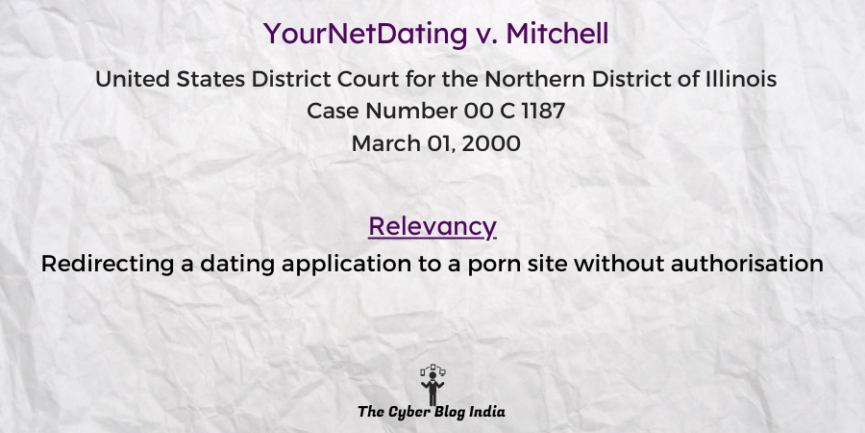YourNetDating v. Mitchell

YourNetDating, LLC. v. Scott Mitchell and Webscapades, Inc.
88 F.Supp.2d 870
In the United States District Court for the Northern District of Illinois
Case Number 00 C 1187
Before District Judge Bucklo
Decided on March 01, 2000
Relevancy of the Case: Redirecting a dating application to a porn site without authorisation
Statutes and Provisions Involved
- The Computer Fraud and Abuse Act, 18 U.S.C. § 1030
Relevant Facts of the Case
- The plaintiff had employed the defendant as a computer programmer. The plaintiff operated an online dating website called YourNetDating.
- The plaintiff alleges that the defendant hacked its website and diverted its clients to a porn site called Sexetera. Once a client went to this porn site, they could not come back to the plaintiff’s website.
- The plaintiff learned about this after receiving a customer’s complaint. The defendant had a monetary stake in Sexetera.
- The plaintiff has filed for a temporary restraining order (TRO) against the defendant, among other charges.
Prominent Arguments by the Counsels
- The plaintiff’s counsel argued that the defendant had already admitted to creating a user profile that redirected the users to Sexetera. Making such a profile requires administrator access, which the defendant had. The counsel further submitted that the plaintiff has suffered irreparable harm due to the defendant’s malpractices. As he also had a stake in this porn site, he intended to harm the plaintiff’s reputation.
- The defendant’s counsel submitted that he denied any claims of unauthorised access and hacking of the plaintiff’s website.
Opinion of the Bench
- The defendant’s actions have caused harm to the public interest. A user visiting the plaintiff’s website seeks to view a dating website, not hardcore pornography.
- The plaintiff has suffered irreparable damages as the customer who complained was not likely to come back.
- It is apparent that he accessed the plaintiff’s website without authorisation to redirect the incoming users.
Final Decision
- The court granted a temporary restraining order while considering other claims to be premature at this stage.
